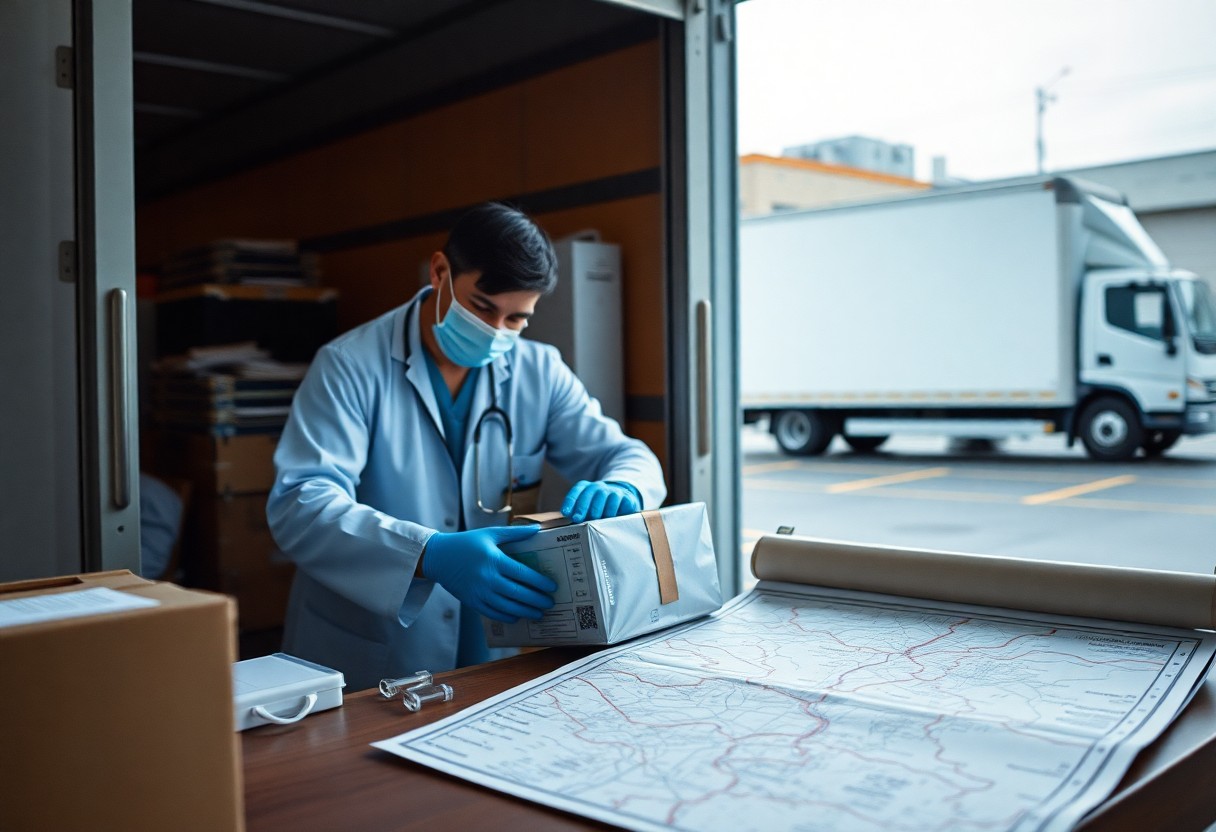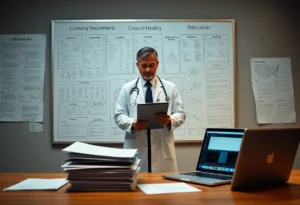You’re about to commence on a significant move, one that requires precision and planning. Your medical career is taking you to a new location, and you need to ensure a smooth transition. As you prepare for this journey, you’ll need to consider several key factors, from licensure to logistics. You’ll want to take a methodical approach to ensure your relocation is efficient and hassle-free, allowing you to focus on what matters most – your patients and your practice.
Preparing for Relocation
While planning your doctor relocation, you’ll need to take several steps to ensure a smooth transition. Your new location, job, and living arrangements must be carefully considered to make this journey seamless.
Researching New Locations
Planning ahead, you’ll want to research new locations that fit your needs and preferences. You’ll consider factors like cost of living, climate, and proximity to your workplace, helping you make an informed decision about your new home.
Evaluating Job Opportunities
Between the various job offers you’ll be considering, you’ll need to weigh the pros and cons of each. You’ll look at factors like salary, work-life balance, and opportunities for professional growth, helping you choose the best fit for your career.
Researching the job market in your new location, you’ll get a sense of the local medical landscape and what to expect from your new role. You’ll investigate the hospital or clinic, your potential colleagues, and the patient population, giving you a clear understanding of what your new job will entail and whether it’s the right choice for you.
Logistics and Planning
Any doctor relocation journey requires meticulous planning. You’ll need to tie up loose ends, prepare your family, and make travel arrangements. Your focus should be on a smooth transition.
Sorting Out Finances
Across the board, financial planning is key. You’ll need to sort out your budget, considering costs such as moving expenses and potential losses. Your financial stability will depend on it.
Coordinating Moving Details
Along with planning, you’ll need to coordinate your move. You’ll have to arrange for packing, storage, and transportation of your belongings. Your goal is a hassle-free relocation.
Indeed, coordinating moving details can be a daunting task. You’ll need to research and hire a reliable moving company, pack your belongings efficiently, and ensure everything arrives at your new location safely. Your attention to detail will make all the difference in a successful relocation.

Licensing and Certification
Some doctors face difficulties when relocating due to varying state licensing requirements. You’ll need to research and understand the regulations in your new location to ensure a smooth transition. Your medical license and certifications must be in order before you start practicing.
Meeting State Requirements
Above all, you must meet the specific state requirements for your medical license. You’ll need to submit your application, pay the required fees, and provide necessary documents to obtain your new license.
Obtaining Necessary Certifications
Certification is key to your professional credibility. You should obtain the necessary certifications to practice in your new state, which may include board certifications or specialized certifications.
A thorough review of the certifications required in your new state will help you plan your relocation. You should check with your new state’s medical board to determine the specific certifications you need and the process for obtaining them. This will ensure you’re well-prepared and can focus on your new practice.
Networking and Building Connections
Despite the complexity of doctor relocation, building a strong network can simplify your journey. You’ll find that having the right connections can make all the difference in establishing your medical practice and getting settled in a new location.
Establishing Professional Relationships
One key aspect of networking is establishing professional relationships with other doctors and medical professionals in your field. You can start by attending conferences and reaching out to colleagues in your new location to introduce yourself and start building your network.
Joining Local Medical Communities
Networking opportunities abound when you join local medical communities, allowing you to connect with other professionals and stay up-to-date on industry developments. You’ll find that these communities provide valuable support and guidance as you navigate your new environment.
Even as you balance the demands of your medical practice, take time to engage with local medical communities, such as online forums or social media groups, to expand your network and stay informed about local health issues and medical advancements that affect your patients and your work.
Personal and Family Considerations
Many factors come into play when considering a doctor relocation. You must think about your personal life, family, and how this move will affect them.
Relocating with Family
Personally, you will need to consider the impact on your spouse and children, ensuring their needs are met in the new location, including schools, childcare, and social support for your family.
Maintaining Work-Life Balance
Beneath the surface of a successful relocation lies your ability to balance work and personal life. You will need to find ways to manage your time effectively, prioritizing your well-being and your family’s needs.
Considering your work-life balance, you should think about the demands of your new role, the commute, and the local lifestyle. You must ask yourself: what are your non-negotiables, and how will you maintain a healthy balance between your professional and personal life, ensuring a smooth transition for you and your loved ones.
Execution and Transition
Not every doctor relocation journey is the same, but with a solid plan, you’ll navigate the process with ease. Your transition will be smoother with a clear understanding of what to expect.
Finalizing Moving Arrangements
To tie up loose ends, you’ll need to confirm your moving details, including transportation and accommodation. You’ll want to ensure a seamless transition to your new location.
Settling into New Role
Moving into your new position, you’ll need to get acquainted with your colleagues and the hospital’s procedures. You’ll be eager to start making a difference in your new role.
Understanding the dynamics of your new workplace is key to a successful transition. You’ll want to learn about the hospital’s policies, familiarize yourself with the equipment, and build relationships with your new colleagues. As you settle into your new role, you’ll find your footing and become an integral part of the team, providing top-notch care to your patients.
Summing up
From above, you’ve gathered the necessarys for a smooth doctor relocation journey. You’ve got your visa in order, your credentials verified, and a plan in place. Now, you can focus on the details, like finding your new home and getting familiar with your new surroundings. You’re all set to take your medical career to the next level, with your skills and expertise in high demand. Your seamless relocation journey awaits, and you’re ready to make the most of this new chapter in your life.
FAQ
Q: What initial steps should I take to ensure a smooth doctor relocation journey?
A: To begin with, it’s vital to start planning well in advance, ideally 6-12 months before the intended relocation date. This allows sufficient time to complete the necessary paperwork, obtain licenses, and secure a new position. Additionally, researching the destination, including cost of living, housing, and local healthcare regulations, is vital for a seamless transition. Creating a comprehensive checklist and timeline will help stay organized and focused throughout the relocation process.
Q: How do I navigate the complex process of obtaining medical licensure and certification in a new location?
A: Obtaining medical licensure and certification in a new location can be a lengthy and intricate process. It’s necessary to familiarize yourself with the specific requirements of the destination country or state, which may include exams, background checks, and verification of credentials. Engaging with professional organizations, such as medical boards or licensing authorities, can provide valuable guidance and support. Moreover, leveraging online resources and consulting with colleagues who have undergone similar relocations can offer invaluable insights and help streamline the process.
Q: What strategies can I employ to manage the logistical and emotional aspects of relocating my family and personal life as a doctor?
A: Relocating as a doctor can be a significant undertaking, affecting not only your professional life but also your personal and family life. To manage the logistical aspects, it’s helpful to create a detailed moving plan, including arranging for housing, schools, and healthcare for your family. Emotionally, it’s vital to maintain open communication with your loved ones, addressing any concerns or anxieties they may have. Building a support network, whether through social connections, online forums, or professional networks, can provide emotional support and help you stay connected during this significant life change. Prioritizing self-care and taking time to acclimate to the new environment will also help mitigate the stresses associated with relocation.




